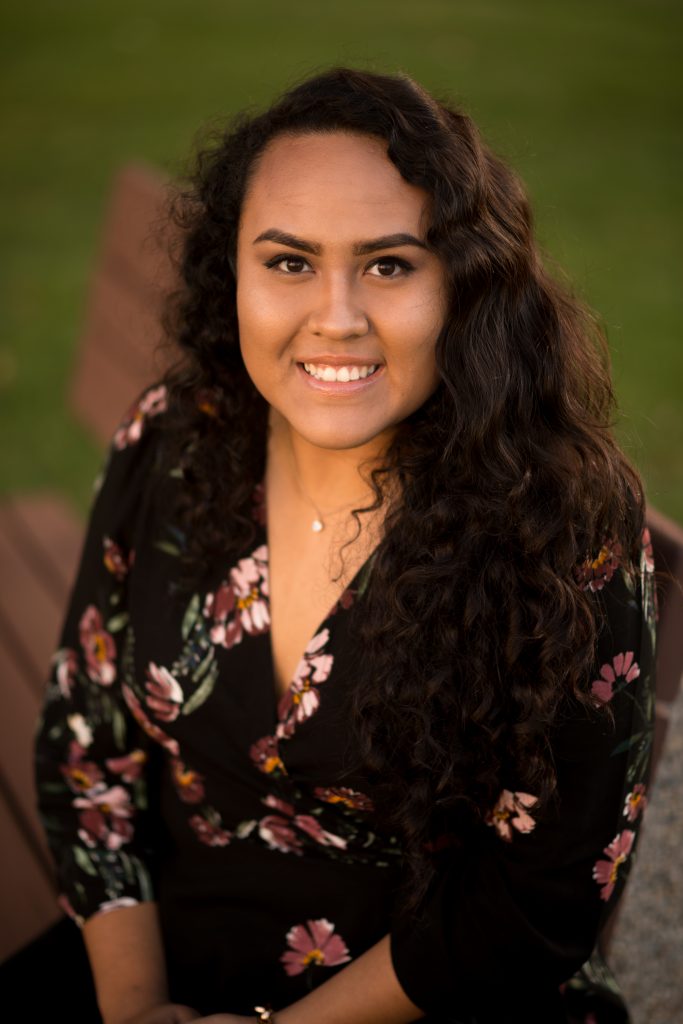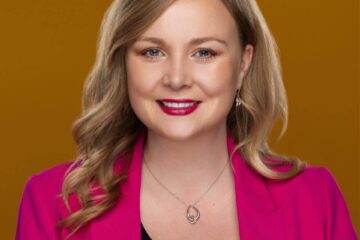By Fabiola Schirrmeister
As we celebrate Women’s History Month, I want to highlight a Latina woman who is breaking barriers and leading in a field dominated by men. Her immigration story helps me remember that leadership comes with a lot of sacrifice and hard work.

Isamar Caro Gonzalez was born in Mexico City and immigrated to Iowa when she was only 4 years old. She is currently in her second year at Iowa State University studying chemical engineering with a minor in biomedical engineering. One of her main goals is to become a prosthesis designer and support and empower other Latinas to finish high school and get a bachelor’s degree.
During my interview with her, she reflected on her life and how far she has come, thanks in part to the hard work and dedication her parents put forth for her and her brother.
How did you get here to Iowa?
“My family moved to Iowa from Mexico City because they wanted us to have a better life. At the beginning, I didn’t know exactly how we ended up here; my parents never told me anything about crossing the border until I was in fourth grade. I was with my mom and she was working cleaning a house. The owner of the house had a good relationship with my parents and invited me to go with their family to Disney World. My mom said that I couldn’t go, so of course I was super upset ― that’s a dream for every kid at that age. After that day my parents talked to me about it and they said that even if they wanted me to go I couldn’t because we didn’t have Social Security numbers, and they explained to me that we could be caught and could be deported to Mexico. That really hit me hard.”
Isamar remembers that specific day as one of the days that changed her life completely. She was very upset and frustrated that she didn’t have the same freedom as other kids around her. Isamar was either one of a very few Latina students or the only Latina student at her Waukee elementary school 15 years ago.
How was it for you, growing up in Iowa?
“As a kid I think I had a pretty normal childhood, even with my immigration status. I adapted quickly to school and I learned English very fast with the ESL program. I knew I was a smart girl from a young age, but some people had assumptions about me, maybe because I was an immigrant or because I was the quiet and shy girl in the back. For some reason I didn’t want to be noticed. I remember one time in middle school, some people at school would ask me, ‘Why do you have curly hair?’ And I said to them that’s the way I was born. From then on, I started to wear ponytails and never wear my hair down because I didn’t want to be the girl with the weird hair. Now I laugh about it, but it definitely made me change my style. I was trying to fit in more and not be myself. Now I love my hair, but it took me years to realize that I needed to accept myself, including my hair.”
What are some of the challenges you had growing up as an undocumented immigrant? “Not being able to travel and go back to see my grandmother, my cousins and other family. Not knowing if I was going to be able to have a driver’s license. I stressed out about my parents being deported. I realized many things that I was not able to do just because I didn’t have a Social Security number. Some of us just take for granted those basic things, but unfortunately it’s not the same for everyone.”
Isamar was able to obtain Deferred Action for Childhood Arrivals (DACA) status from the Obama administration right after the bill was announced back in 2012. DACA protected her and many others from being deported and allowed them to obtain a work permit in the U.S. She was in high school when that happened, just in time to have a driver’s license.
“Before DACA, my mom was thinking about going back to Mexico, my parents divorced and everything was kind of chaotic. Just weeks before we were planning on moving back to my hometown, DACA was released, so we were able to stay and I was able to continue with my dream to become an engineer, just like my brother.”
How did you overcome obstacles in your life?
“My family always supported me and they worked hard to offer me and my brother more opportunities than what they had when they were young. They always told us that the only option we had growing up was one to study and go to university. Also being part of leadership roles in school and in the community.”
Isamar learned to step up little by little. Although she was the quiet girl at school, her dedication and big spirit to become a better person led her to different roles. She helped lead ministry classes at Impact University Church Camp, was a marching band section captain, and worked as a hostess, cashier and trainer at Los Tres Amigos Mexican Restaurant. She was also part of the Junior Olympics and is now a member of the rugby team.
When did you realize you want to become an engineer?
“My brother Jose studied engineering first, but I was very good at math and science, so I started taking engineering classes in middle school. It was challenging at the beginning, especially because I was the only girl in the class. But my confidence started to grow and I knew that was the field I want to be in. People just assume that girls are not as smart as boys, so I needed to step up and prove them wrong so they would take me more seriously. Even now in college, I always want to take the lead and be the first one to send the group email to make sure we all are on the same page.”
Isamar was able to obtain a full scholarship for college, thanks to her hard work, good grades and dedication. “A lot of multicultural scholarship recipients don’t want to say that we have it, because some people assume that you get it just because you are multicultural. I want to make sure people understand that you need to work hard in order to obtain it.”
Not only is she studying, but she’s also empowering others at Iowa State. Isamar is a peer mentor and helps new students make a smooth transition in acclimating to campus and establishing a sense of belonging. She is also an admissions outreach ambassador, where she leads meetings with members regarding upcoming school events.
How is it for you, being a Latina leader in engineering, knowing that men dominate in the field?
“I have the experience and knowledge to back it up, and I continually keep learning from others to push me to be a better person. Now I make sure they notice me. As I said, I was the only girl in engineer class in middle school; they didn’t even talk to me, I was always the first to start their conversations. I still do the same, I’m the icebreaker, and by the end of any project we are friends.”
What would you say to young Latinas who want to be in similar careers led by men?
“Be confident. I was afraid at the beginning, but you need to make sure to start connecting with people, and especially with your professors. You will need reference letters in the future. Don’t question your possibilities, and if you are ever wrong for some reason, you will learn from that.”
Talking about leadership and opening doors for others, what is leadership for you?
“As a person who holds many leadership positions, not only am I trying to help and teach people about my past experiences but also I try to learn from them. I try to help guide others through things that I wish I was guided on. I have learned a lot about being a leader as I continue to get these positions. Being an effective leader is not telling people what to do but showing from examples. I attempt to lead the life I want my students to lead so they can see that it is possible.”
Who is your inspiration in life?
“Someone who inspires me every single day are my parents and stepparents. I have learned about work ethic, loyalty and hardship from these people in my life. Every single day I am reminded that I will continue to need their guidance. I want to always be learning about new ways to be a leader. As I meet new people in life, I want to always take something away from them. Whether they give me advice or I see them do something that I want to incorporate into my life. Being an immigrant has given me the opportunity to learn how to be more appreciative and patient with people because I know what it means to work with your hands. My dad works in construction doing drywall and my mom cleans houses. I always helped them when I could, and now I know exactly the efforts they put in their jobs. I remember my mom complaining about how much her hands hurt, and that makes me realize now that I’m proud of her and I admire her because of not having anything and coming here and all the struggles she had. That makes me feel more proud of where I came from. Working with your hands deserves the same respect as if you work with your mind, and I’m not afraid to get dirty and do the job or talk to people that are not in my same field.”
What would you say to your kids when you have a family?
“When my parents immigrated to the U.S., nothing was handed to them. They started from zero, they handed me some things, but I needed it to earn it, too. I would want my kids to understand that a lot of people have come before us to be where we are right now. Now I can say my parents are successful, but it took them many years of hard work to get there; we weren’t privileged. I grew up in Waukee in a trailer park. Now my parents have a home. Some people don’t know your beginning and assume your life was easy. Never forget where you come from so you can pass it to your generations.”
Ismar’s story reminds us that “Si se puede! Yes we can!” Life isn’t always fair. As kids we don’t decide where we’re born or where we grow up; only life will show us the way. She is an example of what immigrants have to do in this county, not only work harder than everyone else because of resources, but we also open doors for next generations and become leaders of our communities. Being a woman, Latina and an immigrant can be challenging, but it’s your hard work and dedication that will pay it forward for you to become someone in life. Now Isamar is a permanent resident and she travels all the time to Mexico to visit her family. There is no quiet or shy girl anymore, only a fierce woman who soon will be 21 years old graduating from Iowa State and representing our Latinx community wherever she goes.
Fabiola Schirrmeister was born and raised in Ciudad Obregon, Sonora, Mexico. She has worked in the communications industry since 2011. A graduate of the University of Sacred Heart in Puerto Rico, she has had the opportunity to work with Telemundo Puerto Rico, WIPR and Azteca America Tucson and in Latino radio in Des Moines as a host and producer. One of her passions in life and in her career is to provide platforms to educate, inform, create awareness and empower the Latino community.


